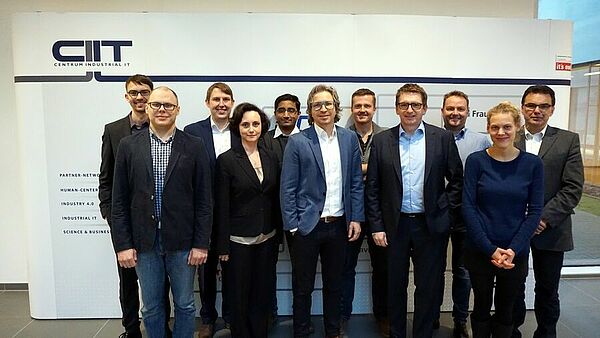Everyone knows it: The washing machine does not work and the source of the problem is untraceable. Not just private households have this problem, but also for example industrial laundries. For big companies it is even more difficult to locate the problem, because various machines like washing machines, driers and ironing machines are connected to one big network. How can companies facilitate the maintenance of industrial networked machinery so that they can quickest possible react to malfunctions, minimize downtimes and reduce maintenances? Researchers from inIT together with the industry partners Kannegiesser and ISI Automation are working on this in their project “ADIMA”. Industrial plants shall be able to independently detect upcoming problems and support the fitters with displaying maintenance and troubleshooting guidance information via mobile devices, data glasses or projections. A client can directly react to upcoming problems, increase the availability of machinery and reduce the hiring von technical personnel.
Project goal is the development of an intelligent assistant system that – basing on mechanical learning algorithms - independently generates maintenance information from decentralized recorded data. This information is visualized so that maintenance work can be successfully done by locally based technicians – even without machine-specific knowledge. Three working groups of inIT are currently working on this interdisciplinary project. “We want to realize a simple maintenance and a targeted diagnosis of plants with multimodal human-machine-interfaces to make possible a reduction of downtimes with a simultaneously increased working comfort for the worker”, explains Professor Carsten Röcker (Project Leader and Board Member of inIT). Computer based assistant systems are the key for the researchers from Lemgo to make the increasing complexity of plants controllable. Workers can work more efficient, safer and even more comfortable.
“The developments made in the project will be continuously tested for their practicability. During the course of the project a demonstrator of the assistant system will be set up in connection with a real plant”, explains Professor Oliver Niggemann (Board Member of inIT). “The demonstrator can be seen in the factory environment of SmartFactoryOWL that shows productions of the future in the context of Industry 4.0.” Professor Jürgen Jasperneite (Director inIT) adds: ”The striven for assistant system is basing on the Internet of Things (IoT) with which we collect data from different locations of the machines and their environment. This information is processed for the following knowledge creation.” With a reduction of the necessary service calls plant manufacturers in the field of maintenance service can focus on the lucrative spare parts business, so Röcker. Researchers from inIT plan a first launch for 2019.
About ADIMA:
Involved in the project are, besides the Institute Industrial IT (inIT) of OWL University, also ISI Automation GmbH and Kannegiesser GmbH. The project is funded by the Federal Ministry of Education and Research (BMBF) with a total of 600,000 Euros for three years. inIT is located at CENTRUM INDUSTRIAL IT (CIIT) and is working on solutions for the factory of the future together with partners from industry and science.


